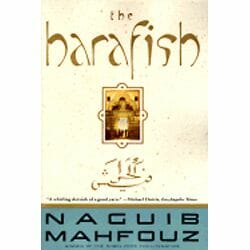5 Questions with Catherine Cobham on Translation Mahfouz’s ‘Harafish’
 Catherine Cobham has translated a number of significant Arab authors: Yusuf Idris, Hanan al-Shaykh, Nawal al-Saadawi, and Mahmoud Darwish. She is also the translator of one of Mahfouz’s greatest works, The Harafish, published in English in 1994.
Catherine Cobham has translated a number of significant Arab authors: Yusuf Idris, Hanan al-Shaykh, Nawal al-Saadawi, and Mahmoud Darwish. She is also the translator of one of Mahfouz’s greatest works, The Harafish, published in English in 1994.
ArabLit: If you were to re-translate The Harafish now, twenty years on, would you do anything differently?
Catherine Cobham: Of course if I were to start translating it again now some things would be inevitably be different, though not necessarily better or worse, as with any kind of writing. On the whole I was more satisfied with it than some things I’ve translated. I can’t really comment on details as I haven’t read the translation for some years!
AL: What did the translation process teach you about Mahfouz’s work?
CC: That he is a very meticulous writer who has a reason for every passage he writes and how he writes it. It also made me appreciate his work more. Mahfouz is not one of my favourite Arab writers and I wouldn’t have considered volunteering to translate a work of his, but when I was approached to do it and agreed, I was struck by the fusing of lyrical passages with hard-hitting and sometimes humorous subject matter. I think probably al-Harafish is more appealing to me personally than some of his other work, so it was lucky that I was asked to translate it rather than another novel by him. I understand also that it was his favourite among his works and he wondered why it wasn’t better known.
AL: Do you note any particular difficulties in rendering Mahfouz in English? (v. translating Hanan al-Shaykh, for instance, or Darwish or al-Takarli?) Could you describe how you found or built Mahfouz’s voice in English?
CC: When I translated the first few pages of al-Harafish, I found it hard going and very different from anything else I’d translated up till then. This wasn’t so much to do with the difficulty of the language but the fact that I didn’t feel much sympathy with the mood or tone (see above!). Gradually I found that Mahfouz has a very clearly defined voice and one that is quite distinct from my own, so eventually I found al-Harafish in a way easier and more satisfying to translate than the work of some writers whose voices are less clearly defined and, in particular, less consistent. In these latter cases I think there is more of a risk of the translator inadvertently imposing his/her own voice on a translation.
AL: Did you consult Mahfouz during the translation process? Who or what did you consult? What were the most difficult aspects of translating “Harafish,” and how did you get over/around/through them?
CC: I only wrote to Mahfouz once quite near the beginning of the translation process. This was regarding the translation and connotations of the title and the word harafish. I think I should probably have found an alternative title, but couldn’t think of a word or phrase that was largely positive but non-sentimental and non-polemical, as he said that to him within the novel harafish meant the ‘common people’, the ‘toiling masses’ etc. He also conveyed via the publishers in response to a question of mine, that he wanted me to keep the Persian songs from the Sufis in the monastery in some kind of transliteration to get across how incomprehensible they sounded to the ordinary people in the alley. I’m not too sure if this works but Mahfouz agreed to the compromise of translating the last verse as this had some significance in the text (maybe some of the other Persian verses do too but I don’t know the language and had to rely on an Iranian colleague to do the transliterations.)
I can’t really remember the most difficult aspects of translating Harafish as I began it around 20 years ago! As I mentioned above, once I got going it was easier than many translations I’ve done, which is a testimony to Mahfouz’s craftsmanship and technical skill I think. I had to research some of the cultural aspects of issues to do with popular Sufism and the various positive and negative connotations of the harafish generally from mediaeval times to the 20th century.
AL: Is there a book or two of Mahfouz’s you think are particularly under-appreciated? Something outside the regular cannon that you particularly love?
CC: Not really. As I point out above, I’m not a Mahfouz scholar. I do think some of his works are ripe for re-translation.
Catherine Cobham, St Andrews, 31 October 2011.

November 14, 2011 @ 6:07 pm
The major stylistic feature in the Harafish, I would say, is that it strives to be fairy-tailish by using artificially baroque words (for instance, when saying “he looked at her”, instead of using the regular نظر إليها, which is perfectly formal, he will say فرمّقها, which is a word you would probably only encounter in medieval poetry).
November 14, 2011 @ 6:09 pm
I remember there was a great double-entendre in one chapter, where the father of one of the characters is heralding his son’s ascendancy as the neighborhood strongman: فراح يبشّر بالعهد الجديد which literally means “He went to herald the new era that had begun” but which could also be read as “He went to evangelize the New Testament”. Possibly translation to combine the literally and the implied: “He went to spread the Good Word.”